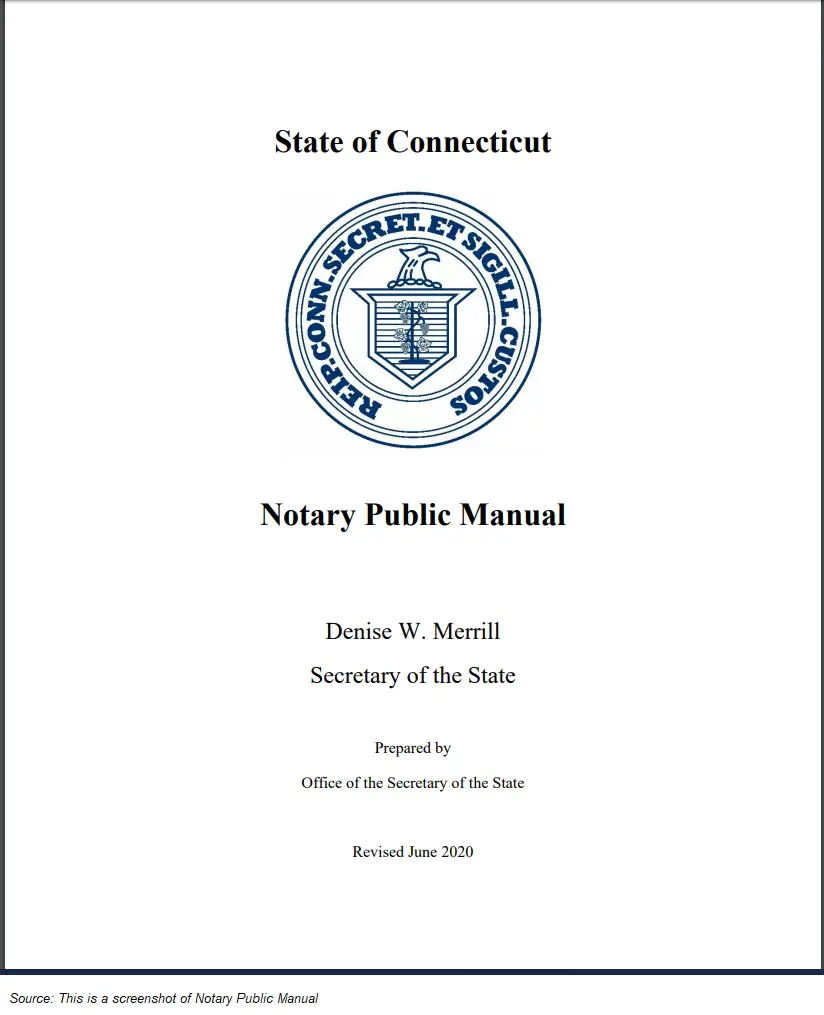(**) Disclosure: This post may contain affiliate links, meaning our company, JCHQ Publishing will get a commission if you decide to make a purchase through the links, but at no additional cost to you.
To become a notary loan signing agent in Connecticut, you must
- Meet the state eligibility requirement
- Review the Notary Public Manual;
- Complete a Jurat and Writing Sample;
- Submit the Certificate of Character;
- Pass the notary exam
- Submit an application to the CT Secretary of State;
- Pay the $120 registration fee;
- Purchase the notary stamp and other business supplies
Although you could work on different types of documents, the loan signing business in the real estate market seems to be a lucrative niche.
So what does a loan signing agent do? When people are getting a mortgage to purchase a house, or they need to refinance their property, there will be loan documents involved. Your role as a notary loan signing agent is to walk through the set of loan documents with the borrower and witness them in signing the paperwork.
You would also need to verify the identity of the signers, place the notary stamp on the signed documents, then send them back to the signing services company or closing attorney.
But keep in mind that you should NOT be providing legal advice, and you cannot explain the terms of the loan documents to the borrower.
In this guide, you’ll find out the steps to become a notary in Connecticut, income updates, and FAQ about this profession.
But before we start, I want to give a brief disclaimer. This post is not intended as legal advice or state/federal notary public training. It is for general information only. Please check with your state to be sure that loan signing agents are utilized in the closing process. Always follow your state’s notary laws and best practices.
Would you like to learn how to make $75 to $200 per signing appointment? You must check out the Loan Signing System from Mark Wills. (**) This is one of the best training programs for loan signing agents. Many students have achieved remarkable business success after taking this program.
8 Steps to Become a Notary in Connecticut

Step 1: Meet the eligibility requirement
- At least age 18 of age
- A resident/ have a place of employment or practice in Connecticut
Step 2: Review the Notary Public Manual
It is necessary to equip yourself with notary knowledge. This way, you’ll know the best practices on what you can or cannot do.
According to the Secretary of State website, you must review the Notary Public Manual. It is a 36-pages PDF file that covers most of the rules you need to know about being a notary public.

Below are the topics being covered:
- The Notary Public
- Application for Appointment as a Notary Public
- Appointment of the Notary Public
- Duties and Responsibilities of the Notary Public
- Additional Useful Information for Notaries Public
- Liability, Bonding and Insurance
- Disciplinary Action
- Notary Fees
- The Office of the Secretary of the State
Step 3: Complete the Jurat and Writing Sample
This part of the application requires to respond in your own handwriting. It consists of four questions.
Question 1: Write out the complete form of acknowledgment for either an individual or a corporation.
Question 2: Write out the form that a notary public would complete, when a sworn statement (affidavit) is made.
Question 3: Write out the oath administered to a notary public.
Question 4: Describe the ceremony of administering an oath.
Quote from Jurat and Writing Sample
You must sign and take an oath before a notary public or a town clerk or other authorized official. An oath of office is an affirmation that you agree to assume the duties of a notary public and that you will comply with the rules and laws.
Once the document is completed, you may upload it during the online application process.
Step 4: Obtain a Certificate of Character

The CT Secretary of State needs to ensure that you will be a trustworthy notary, and that will serve the public with integrity. Therefore, they require a third-party to fill out the Certificate of Character. This helps to prove that you are a person of good moral character.
In making sure that this statement is credible, the person cannot be related to you and must have known you for at least one year.
Step 5: Submit the notary application to the Secretary of State

The Connecticut Secretary of State is responsible for appointing and commissioning notaries. You need to fill out the application on their eLicense website.
When you are registering for the first time, the system will send you a verification email. You must click on the verification link in the email. Sometimes, the email could fall into the junk folder by mistake, so make sure you watch out for it.
Most of the questions on the application are pretty strict forward—for example, your name, business address, background info. It’s better to check that the name on the application will be the same as when you are notarizing documents.
Also, remember to upload the required documents such as the “Certificate of Character” and the “Jurat and Writing Sample.”
There is a $120 application fee. You can pay with an eCheck or a credit card such as VISA, MasterCard, Discover, American Express.
If you need any help on the registration process, here is their instruction guide.
Pass the CT notary exam
The exam is part of the online application process. It is to test how well you know the materials contained in the Notary Public Manual. You must answer every question correctly in order to pass it.
Step 6: Receive the notary commission certificate
Once your application is approved, you will be provided with a notary commission. The Secretary of State will notify you through email and it usually takes 3-5 business days after they receive your application.
Then it is better to review and make sure all the details on the commission are correct. (e.g., your name, county of residence, commission dates).
Step 7: Get a notary stamp

Although it is optional to get a notary seal or rubber stamp, it is a helpful business tool for your notary practice. It ensure including specific info in every document so you won’t leave out any required details. It also helps prevent fraudulent acts and make the signing agent an impartial witness.
You may purchase the notary seal from office supplies store. Also, its design must comply with the regulatory rules. It must include the notary’s name as appears on the certificate, the words “Notary Public”, and “Connecticut.”
Here are two samples I found in the Notary Public Manual.

You must keep the notary seal in a locked and secured area, where only you have direct and exclusive control of it. (e.g. a locked drawer or cabinet.)
Step 8: Maintain a good record of business practice with a notary journal

As a notary signing agent in Connecticut, although it is not mandatory, it is better to maintain a journal of all the notarial acts. Keeping a good record of your notary acts is an essential part of good business practice. It could serve as proof that you have taken reasonable steps to identify the signer of a document.
If your journal is maintained in a physical format, you should have one bounded with pre-printed pages. You may find it at stationery, office supply stores, or through notary associations.
Whereas for a journal in an electronic format, it needs to be a permanent, tamper-evident. Make sure that it is complying with the rules of the Secretary of State.
For each entry of your journal, you should write down the following information:
1. the date and time of the notarial act;
2. the nature or type of notarial act performed;
3. a description of the document or proceeding;
4. the signature, printed name and address of each person for whom a notarial act is performed;
5. the method by which a person’s identity has been determined;
6. the fee, if any is charged; and
7. the place where the notarial act was performed
Quote from State of Connecticut Notary Public Manual
Furthermore, you should retain the journal for at least 10 years from the last notarial act recorded in the journal.
Here’s a Snippet of What Stephanie Espinal Think about Being a Notary Signing Agent!

“My advice is that don’t be afraid to start the loan signing career on a part-time basis. I would also tell them that they need to be passionate about the profession and not just because of the money. They must dedicate their time to learning the business and notarial laws from your state.
You will be working with people’s financial lives and any mistake you make with cause them a lot of money.”
– Stephanie Espinal, Notary Loan Signing Agent
Here’s an exclusive interview with Stephanie. In there, she shared what it takes to be a notary signing agent as a side gig, her valuable journey, and secret sauce to success.
Does Connecticut allow remote online notarization?
I like states that have the option for notaries to work digitally. Doing so could bring you great convenience to streamline your notary practice.
Remote online notarization allows you not to be physically present with the signer. Instead, you would verify their the signer’s identity through video and audio conference.
At the time I’m writing the post, there are emergency rules imposed which allows remote notarization in Connecticut. However, this could be a temporary measure. Whether they would revert to in-person notarization afterward is unknown yet. Therefore, you should check with the CT Secretary of State.
If you want to know how can you work from home as a notary? And the tools that you’ll need in your home office. Here’s the post for you.
How much can you make as a notary signing agent in Connecticut?

The average annual income of Loan Signing Agent in Connecticut is $49,959. The income typically ranges between $30,198 to $61,402. Top earning loan signing agents in Connecticut are making over $91,600.
As mentioned earlier, you could work on different documents, but the loan signing in the real estate market could be a lucrative niche.
Top 10 Highest Paying Cities for Loan Signing Agents in Connecticut
| City | Annual Salary |
|---|---|
| Norwich | $53,037 |
| Waterbury | $52,816 |
| Stamford | $51,326 |
| New Haven | $49,509 |
| Norwalk | $48,933 |
| Hartford | $48,589 |
| Bridgeport | $47,751 |
| Danbury | $46,862 |
| Bristol | $46,394 |
| New Britain | $46,115 |
Can you make over $10,000/month as a loan signing agent? Be sure to check out our notary earning guide. You’ll find a case study where a loan signing agent has built her business to such a successful figure.
Source: ZipRecruiter (May 11, 2022)
Is there demand for notary loan signing agent in Connecticut?
As I look into the eLicense database, there are 500 active notaries in Connecticut.
As long as people are obtaining mortgages or refinancing their homes, there would be a demand for notary loan signing agents.
All originated mortgages in Connecticut
[table “CT-mortgage” not found /]Source: Consumer Financial Protection Bureau – Home Mortgage Disclosure Act (HMDA) (Aug 22, 2020)
Some states are “Attorney States,” which means only attorneys can coordinate the closing paperwork of a real estate. Whereas, others are “Escrow States” where escrow companies would handle the mortgage closing.
According to the First American Title, Connecticut is a an “Attorney State.” Here is a post covering the differences between escrow states and attorney states and its impact on the loan signing business. You will also find a case study where a signing agent went from barely making end needs to earning over $10,000/month.
How much does it cost to become a notary in Connecticut?

It costs approximately $155 to become a notary in Connecticut.
Here’s a breakdown of the costs to start a notary signing business
| Notary Application Fee | $120 |
| Notary Stamp (optional) | $17 |
| Journal (optional) | $15 |
There could be other expenses involved, travel expenses, car maintenance, auto insurance, remote notary technology, laptop and other business supplies.
Can a felon be a notary signing agent in Connecticut?

Having a conviction for a felony may impact the application to become a notary signing agent in Connecticut. The Secretary of State needs to make sure that you are a person with credibility, truthfulness, and integrity to fulfill the responsibilities of the position.
The Secretary of the State may deny an appointment to any individual who has been convicted of a felony or a crime;
Quote from Notary Public Manual
As I’m reading the Notary Public Manual, the Secretary of State seems to emphasize on felony or a crime involving dishonesty or moral turpitude.
But having a felony does not necessarily mean your application will automatically be declined. It depends on the severity and nature of the conviction. The Connecticut Secretary of State would review it on a case-by-case basis.
How long does it take to become a notary in CT?
It should take a 3 to 5 business days to become a notary in Connecticut.
How to renew notary commission in Connecticut?
To renew the notary commission in Connecticut, you need to reapply every five years. Around 90 days before your commission expires, you will receive a notification from the Office either by email or mail. If you haven’t received any notice by then, you can send an email to crd@ct.gov.
Basically, the renewal is similar to the procedures as you were applying for the initial commission, where you will do it through their online system.
Furthermore, you would need to get a notary seal with a new expiry date.
To avoid an interrupted business period, begin the renewal process in advance. Don’t wait till your current notary commission is expired.
Can I notarize for a family member in Connecticut?

You must not notarize any documents where you have any financial or beneficial interest in the transaction. Therefore, notarizing a document for any family member could call into question, and such practice should be avoided.
I have more questions about being a notary public in Connecticut, where could I obtain more details?
You may email the CT Business Services Division at CRD@ct.gov
If you are reading up to this point, I bet you must be interested in the notary signing profession. But why reinvent the wheel when there is a proven system that works? Many students had great success following the Loan Signing System (LSS) from Mark Wills. You may click here to check it out yourself. (**)
Disclaimer: The information in this post is for general information only, and not intend to provide any advice. They are subjected to change without any notice, and not guaranteed to be error-free. Some of the posts on this site may contain views and opinions from individual not related to JCHQ Publishing. They do not necessarily reflect our view or position.
(**) Affiliate Disclosure: Please note that some of the links above are affiliate links, and at no additional cost to you. Our company, JCHQ Publishing will earn a commission if you decide to make a purchase after clicking on the link. Please understand that we include them based on our experience or the research on these companies or products, and we recommend them because they are helpful and useful, not because of the small commissions we make if you decide to buy something through the links. Please do not spend any money on these products unless you feel you need them or that they will help you achieve your goals.
Reference:
- First American Title- Your Guide to Real Estate Customs by State (source)
- Connecticut Secretary of State (source)
- Salary.com – Notary Signing Agent Salary in Connecticut (source)
- ZipRecruiter – Loan Signing Agent Salary in Connecticut (source)
- Consumer Financial Protection Bureau – Home Mortgage Disclosure Act (HMDA) (source)


